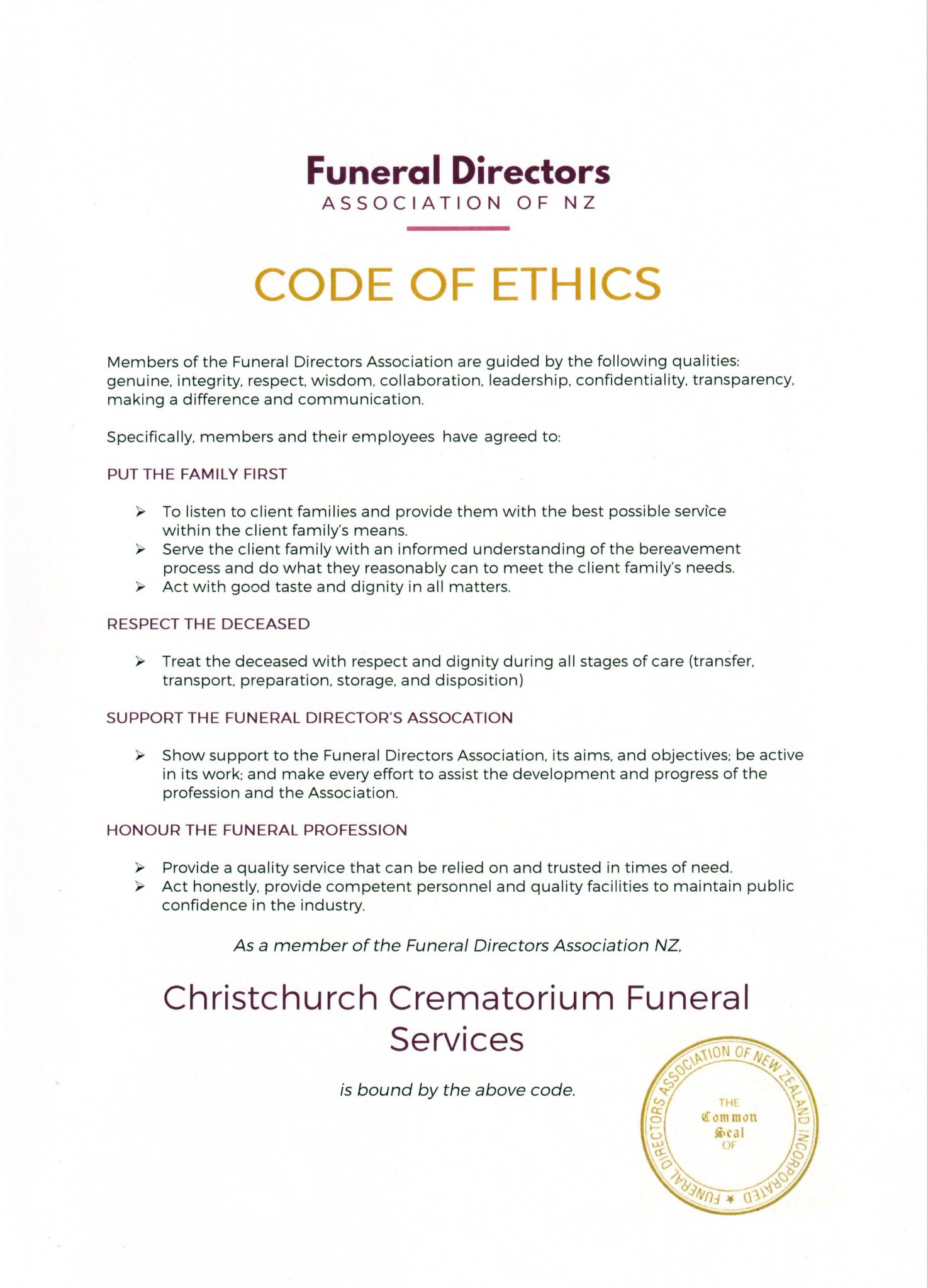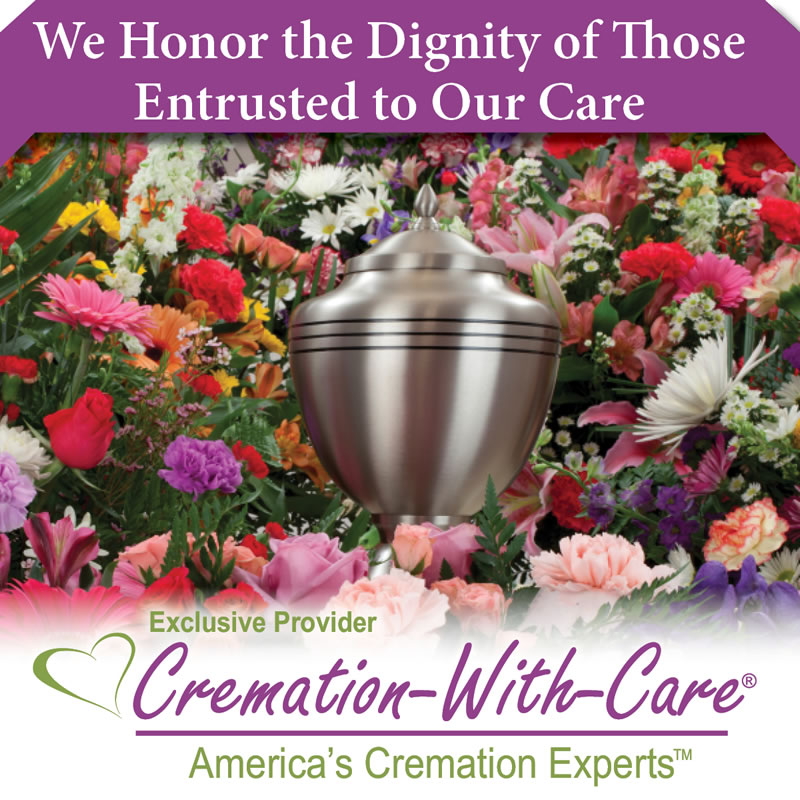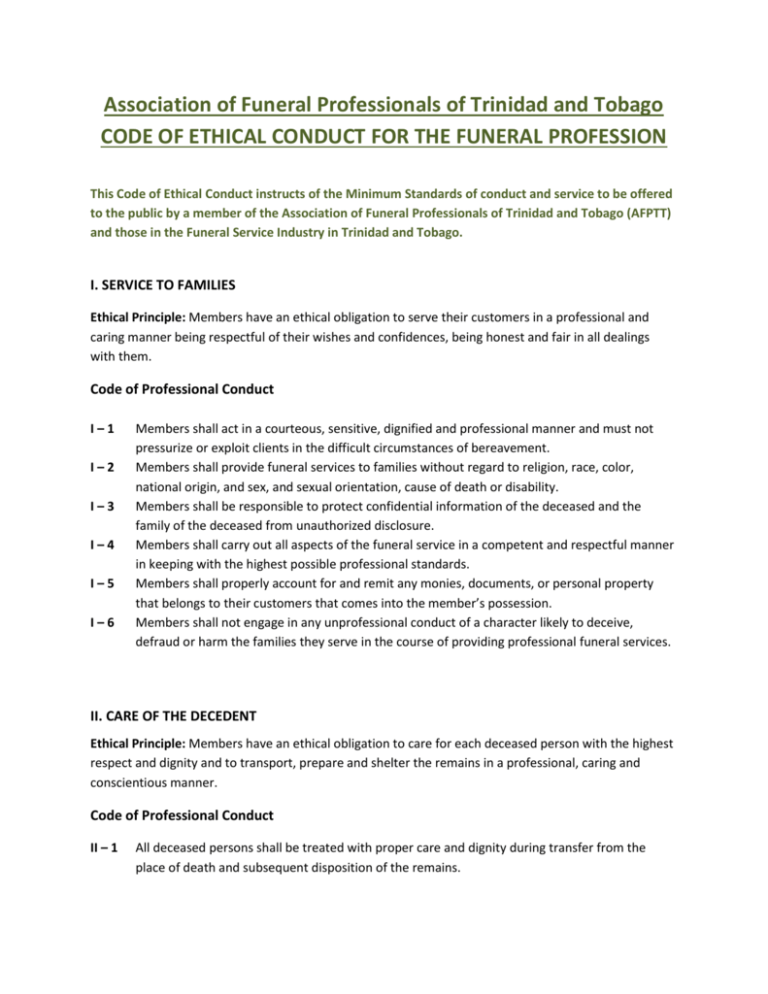The Cornerstone of Compassion: Examining Codes of Ethics in Funeral Homes
Related Articles: The Cornerstone of Compassion: Examining Codes of Ethics in Funeral Homes
Introduction
With enthusiasm, let’s navigate through the intriguing topic related to The Cornerstone of Compassion: Examining Codes of Ethics in Funeral Homes. Let’s weave interesting information and offer fresh perspectives to the readers.
Table of Content
The Cornerstone of Compassion: Examining Codes of Ethics in Funeral Homes

The funeral industry, though often viewed as a somber realm, is built upon a foundation of empathy, respect, and professionalism. A cornerstone of this foundation is the code of ethics, a set of guidelines that dictate the standards of conduct and principles that govern the operations of funeral homes. These codes, often crafted by professional associations and individual funeral homes, serve as a compass, guiding practitioners through the sensitive and complex process of helping families navigate grief and memorialize their loved ones.
The Essence of a Code of Ethics: A Framework for Compassionate Service
A code of ethics for funeral homes typically encompasses several key areas, each designed to ensure that the bereaved are treated with dignity, respect, and transparency:
1. Respect for the Deceased:
- Honoring the Body: The code emphasizes treating the deceased with utmost respect, regardless of their circumstances. This includes ensuring proper care, hygiene, and preparation of the body, as well as dignified handling during the funeral service.
- Religious and Cultural Sensitivity: Funeral homes are obligated to understand and accommodate diverse religious and cultural practices surrounding death and burial. This might involve adhering to specific rituals, providing appropriate attire, or offering alternative arrangements to honor the deceased’s beliefs.
- Confidentiality: The code mandates strict confidentiality regarding the deceased and their family. Information about the deceased, including medical details, personal circumstances, and funeral arrangements, is to be kept strictly private.
2. Professional Conduct and Integrity:
- Transparency and Honesty: Funeral homes are expected to be transparent and honest in their pricing and practices. This includes providing detailed explanations of services, costs, and options, avoiding any misleading or deceptive information.
- Ethical Pricing: The code often addresses ethical pricing practices, discouraging exploitative pricing tactics and emphasizing fair and competitive pricing structures.
- Professional Demeanor: Funeral directors are expected to maintain a professional demeanor at all times, demonstrating empathy, compassion, and sensitivity towards grieving families. They should be respectful of personal boundaries and avoid any actions that could compromise the dignity of the situation.
3. Client Relationships and Communication:
- Empathy and Understanding: The code emphasizes the importance of empathetic communication with grieving families. Funeral directors should actively listen to their needs, offer emotional support, and provide clear, concise information about available services.
- Respect for Cultural Differences: Communication should be tailored to the specific cultural and religious background of the family, ensuring that their beliefs and customs are understood and respected.
- Open Communication: The code encourages open and honest communication between the funeral home and the family. This includes addressing any concerns or questions promptly and transparently.
4. Legal and Regulatory Compliance:
- Adherence to Laws and Regulations: Funeral homes are obligated to comply with all applicable local, state, and federal laws and regulations pertaining to death, burial, and funeral practices. This includes proper documentation, licensing requirements, and handling of cremains.
- Ethical Disposal of Remains: The code addresses the ethical disposal of remains, ensuring compliance with environmental regulations and respecting the wishes of the deceased and their families.
Examples of Code of Ethics Provisions:
To illustrate the practical application of these principles, consider the following examples:
Respect for the Deceased:
- Example 1: A funeral home may have a policy prohibiting the use of harsh chemicals or procedures that could damage or disfigure the deceased’s body.
- Example 2: A funeral home may offer a range of options for religious or cultural rituals, such as providing a prayer room, assisting with specific religious ceremonies, or offering appropriate attire for the deceased.
- Example 3: A funeral home may implement strict protocols for maintaining the privacy of the deceased and their family, limiting access to personal information and ensuring confidential handling of sensitive details.
Professional Conduct and Integrity:
- Example 1: A funeral home may publish a detailed price list outlining all services and associated costs, ensuring transparency and avoiding hidden fees.
- Example 2: A funeral home may adopt a policy of offering competitive pricing, avoiding excessive markups or price gouging during times of grief.
- Example 3: A funeral home may require all staff to undergo training in professional conduct and communication skills, emphasizing empathy, sensitivity, and respect for grieving families.
Client Relationships and Communication:
- Example 1: A funeral home may offer grief counseling services or refer families to support groups, demonstrating a commitment to providing emotional support beyond the immediate funeral arrangements.
- Example 2: A funeral home may have a policy of providing multilingual staff or interpreters to facilitate communication with families from diverse cultural backgrounds.
- Example 3: A funeral home may encourage open dialogue with families, providing regular updates on the progress of arrangements and addressing any concerns promptly.
Legal and Regulatory Compliance:
- Example 1: A funeral home may maintain meticulous records of all deceased individuals, including details of their identification, cause of death, and funeral arrangements, ensuring compliance with legal requirements.
- Example 2: A funeral home may have a system in place for obtaining proper authorizations and consents for all funeral arrangements, ensuring compliance with legal and ethical standards.
- Example 3: A funeral home may adhere to strict guidelines for the disposal of cremains, ensuring compliance with environmental regulations and respecting the wishes of the deceased and their families.
The Importance of a Code of Ethics: A Foundation for Trust and Dignity
A code of ethics is not merely a set of rules; it is a living document that reflects the values and principles that underpin the funeral industry. Its importance lies in several key areas:
- Building Trust: A strong code of ethics fosters trust between funeral homes and grieving families. It assures families that they are being treated with respect, honesty, and compassion during a vulnerable time.
- Maintaining Professional Standards: The code sets a benchmark for professional conduct, ensuring that all funeral homes operate within a framework of ethical principles. This helps to maintain the integrity of the industry and prevent unethical practices.
- Promoting Empathy and Support: The code encourages empathy and understanding towards grieving families, promoting a culture of compassion and support within the funeral industry.
- Protecting the Rights of the Deceased: The code ensures that the deceased are treated with dignity and respect, regardless of their circumstances. This protects their memory and honors their final wishes.
- Guiding Ethical Decision-Making: The code provides a framework for ethical decision-making in complex situations, ensuring that funeral homes act in a responsible and ethical manner.
FAQs Regarding Codes of Ethics in Funeral Homes:
1. What is the difference between a code of ethics and a professional code of conduct?
A code of ethics is a broader set of principles that guide the overall conduct of a profession, while a code of conduct provides more specific guidelines for professional behavior and practice. Both are essential for maintaining ethical standards within the funeral industry.
2. Who creates a code of ethics for funeral homes?
Codes of ethics can be created by professional associations, such as the National Funeral Directors Association (NFDA) or the Canadian Funeral Directors Association (CFDA). Individual funeral homes may also develop their own codes of ethics, reflecting their specific values and practices.
3. How can families ensure that a funeral home adheres to a code of ethics?
Families can inquire about the funeral home’s code of ethics, review it online, or ask for a copy. They can also look for accreditation from professional associations, such as the NFDA, which indicates adherence to ethical standards.
4. What happens if a funeral home violates its code of ethics?
Violations of a code of ethics can result in disciplinary action, including reprimands, fines, or even revocation of licenses. Professional associations and regulatory bodies have mechanisms for investigating and addressing complaints of unethical conduct.
5. How can funeral homes demonstrate their commitment to ethical practices?
Funeral homes can demonstrate their commitment to ethical practices by:
- Publishing their code of ethics clearly and prominently
- Training staff on ethical principles and best practices
- Maintaining open communication with families and addressing concerns promptly
- Seeking accreditation from professional associations
- Participating in industry events and conferences focused on ethics and professionalism
Tips for Families Choosing a Funeral Home:
- Research funeral homes thoroughly: Explore their websites, read reviews, and inquire about their code of ethics.
- Ask about their pricing structure: Ensure transparency and clarity regarding costs and fees.
- Meet with the funeral director: Assess their communication skills, empathy, and understanding of your needs.
- Trust your instincts: Choose a funeral home that you feel comfortable with and that aligns with your values.
Conclusion: The Importance of Ethical Conduct in the Funeral Industry
The funeral industry plays a vital role in helping families navigate grief and honor the memory of their loved ones. A strong code of ethics serves as a compass, guiding funeral homes in providing compassionate and respectful services. By adhering to these principles, funeral homes can build trust with families, maintain professional standards, and contribute to a culture of empathy and support within the industry.
The importance of ethical conduct in the funeral industry cannot be overstated. It is through upholding these principles that funeral homes can truly fulfill their mission of providing dignified and meaningful services to grieving families.






.jpg?v=637876845000000000)

Closure
Thus, we hope this article has provided valuable insights into The Cornerstone of Compassion: Examining Codes of Ethics in Funeral Homes. We hope you find this article informative and beneficial. See you in our next article!